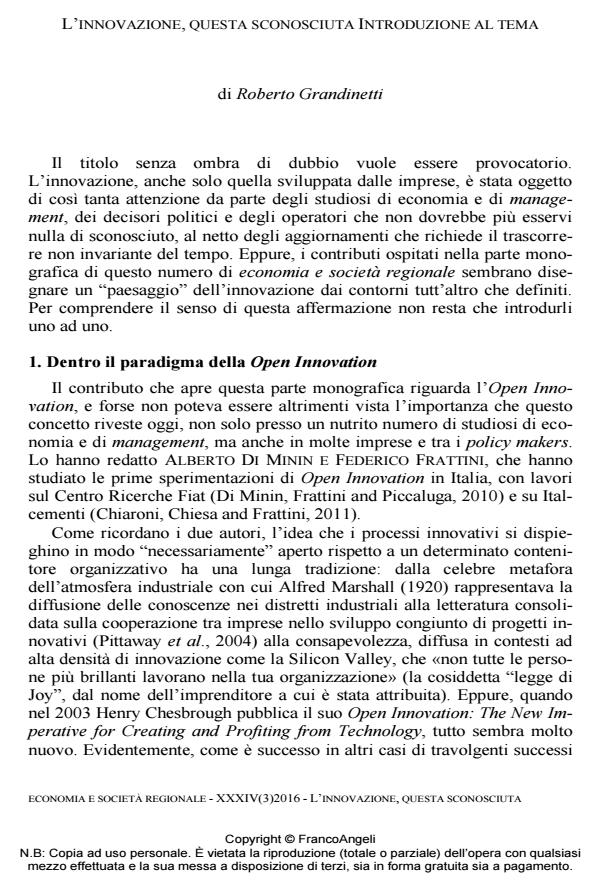Tema monografico. L’innovazione, questa sconosciuta introduzione al tema
Titolo Rivista ECONOMIA E SOCIETÀ REGIONALE
Autori/Curatori Roberto Grandinetti
Anno di pubblicazione 2017 Fascicolo 2016/3 Lingua Italiano
Numero pagine 12 P. 7-18 Dimensione file 225 KB
DOI 10.3280/ES2016-003001
Il DOI è il codice a barre della proprietà intellettuale: per saperne di più
clicca qui

FrancoAngeli è membro della Publishers International Linking Association, Inc (PILA)associazione indipendente e non profit per facilitare (attraverso i servizi tecnologici implementati da CrossRef.org) l’accesso degli studiosi ai contenuti digitali nelle pubblicazioni professionali e scientifiche
- Scott A.J. (2008). Social Economy of the Metropolis: Cognitive-Cultural Capitalism and the Global Resurgence of Cities. Oxford: Oxford University Press.
- Andersson S., Evers N. and Griot C. (2013). Local and International Networks in Small Firm Internationalization: Cases from the Rhône-Alpes Medical Technology Regional Cluster. Entrepreneurship and Regional Development, 25(9/10): 867-888, DOI: 10.1080/08985626.2013.847975
- Audia P.G. and Rider C.I. (2005). A garage and an Idea: what More does an Entrepreneur need? California Management Review, 48(1): 6–28, DOI: 10.2307/41166325
- Becattini G. and Rullani E. (1996). Local Systems and Global Connections: The role of Knowledge. In: Cossentino F., Pyke F. and Sengenberger W., eds. Local and Regional Response to Global Pressure: The Case of Italy and its Industrial Districts. Geneva: International Institute for Labour Studies.
- Belussi F. and Sedita S.R. (2012). Industrial Districts as Open Learning Systems: Combining Emergent and Deliberate Knowledge Structures. Regional Studies, 46(2): 165-184, DOI: 10.1080/00343404.2010.497133
- Bogers M., Zobel A.-K., Afuah A., Almirall E., Brunswicker S., Dahalande L., Frederiksen L., Gawer A., Gruber M., Haefliger S., Hagedoorn J., Hilgers D., Laursen K., Magnusson M., Majchrzak A., McCarthy I.P., Moeslein
- K.M., Nambisan S., Piller F.T., Radziwon A., Rossi-Lamastra C., Sims J.
- Sedita S.R. (2012). Non solo venture capital: Creatività, innovazione e imprenditorialità nella Ca’ Tron Valley. economia e società regionale, 30(1): 126-160, DOI: 10.3280/ES2012-001004
- Sedita S.R., Belussi F. and Grandinetti R. (2016). How does a Networked Business Incubator Fuel Cluster Emergence? A Theoretical Discussion and an Empirical Illustration. In: Boari C., Elfring T. and Molina-Morales F.X., eds. Entrepreneurship and Cluster Dynamics. New York: Routledge.
- Stinchcombe A.L. (1965). Social Structure and Organizations. In: March J.G., ed. Handbook of Organizations. Chicago: Rand McNally.
- Stokols D. (1987). Conceptual Strategies of Environmental Psychology. In: Stokols D. and Altman I., eds. Handbook of Environmental Psychology. New York: John Wiley & Sons, vol. 1.
- von Hippel E. (2005). Democratizing Innovation. Boston: MIT Press.
- Varaldo R. (2014). La nuova partita dell’innovazione: Il futuro dell’industria in Italia. Bologna: il Mulino.
- Wenger E. (1998). Communities of Practice: Learning, Meaning and Identity. Cambridge: Cambridge University Press.
- Saxenian A. (1994). Regional Advantage: Culture and Competition in Silicon Valley and Route 128. Cambridge: Harvard University Press.
- Porter M.E. (1985). Competitive Advantage. New York: The Free Press.
- Pittaway L., Robertson M., Munir K., Denyer D. and Neely A. (2004). Nertworking and Innovation: A Systematic Review of the Evidence. International Journal of Management Reviews, 5-6(3-4): 137-168. 10.1111/j.14608545.2004.00101.x.
- Milanesi M., Guercini S. and Waluszewski A. (2016). A Black Swan in the District? An IMP Perspective on Immigrant Entrepreneurship and Changes in Industrial Districts. IMP Journal, 10(2): 243-259, DOI: 10.1108/IMP-09-2015-0050
- Marshall A. (1920). Principles of Economics. London: Macmillan, 8th ed. Micelli S. (2000). Imprese, reti e comunità virtuali. Milano: Etas.
- Klepper S. and Sleeper S. (2005). Entry by Spinoffs. Management Science, 51(8): 1291–1306.
- Klepper S. (2009). Spinoffs: A Review and Synthesis. European Management Review, 6(3), 159-171.
- Helfat C.E. and Lieberman M.B. (2002). The Birth of Capabilities: Market entry and the Importance of Pre-History. Industrial and Corporate Change, 11(4): 725-760,
- Grandinetti R. (2016). Absorptive Capacity and Knowledge Management in Small and Medium Enterprises. Knowledge Management Research & Practice, 14(2): 159-168,
- Furlan A. and Grandinetti R. (2016). Spinoffs and their Endowments: Beyond the Knowledge Inheritance Theory. Journal of Intellectual Capital, 17(3): 570-589,
- Furlan A. e Grandinetti R. (2012). Cosa sappiamo e cosa dovremmo sapere sulla natalità delle imprese. economia e società regionale, 30(1): 5-23, DOI: 10.3280/ES2012-001001
- Freeman J., Carroll G.R. and Hannan M.T. (1983). The Liability of Newness: Age Dependence in Organizational Death Rates. American Sociological Review, 48(5): 692-710.
- Di Minin A., Frattini F. and Piccaluga A. (2010). Fiat: Open Innovation in a Downturn (1993-2003). California Management Review, 52(3): 132-159,
- Del Baldo M. (2012). Family and Territory Values for a Sustainable Entrepreneurship: The Experience of Loccioni Group and Varnelli Distillery in Italy. Journal of Marketing Development and Competitiveness, 6(3): 120-139.
- Dei Ottati G. (2014). A Transnational Fast Fashion Industrial District: An analysis of the Chinese Business in Prato. Cambridge Journal of Economics, 38(5): 1247-1274,
- Cooke P. and Morgan K. (1994). The Regional Innovation System in Baden-Württemberg. International Journal of Technology Management. 9(3-4): 394-429, DOI: 10.1504/IJTM.1994.025582
- Cohen W.M. and Levinthal D.A. (1990). Absorptive Capacity: A New Perspective on Learning and Innovation. Administrative Science Quarterly, 35(1): 128-152, DOI: 10.2307/2393553
- Chiaroni D., Chiesa V. and Frattini F. (2011). The Open Innovation Journey: How Firms Dynamically Implement the Emerging Innovation Management Paradigm. Technovation, 31(1): 34-43,
- Chesbrough H. (2003). Open Innovation: The New Imperative for Creating and Profiting from Technology. Boston: Harvard Business School Press.
- Camuffo A. and Grandinetti R. (2011). Italian Industrial Districts as Cognitive Systems: Are they Still Reproducible? Entrepreneurship and Regional Development, 23(9-10): 815-852, DOI: 10.1080/08985626.2011.577815
- and ter Wal A.L.J. (2016). The Open Innovation Research Landscape: Established Perspectives and Emerging Themes across Different Levels of Analysis. Industry and Innovation, 23(8): 1-33, DOI: 10.1080/13662716.2016.1240068
Roberto Grandinetti, Tema monografico. L’innovazione, questa sconosciuta introduzione al tema in "ECONOMIA E SOCIETÀ REGIONALE " 3/2016, pp 7-18, DOI: 10.3280/ES2016-003001